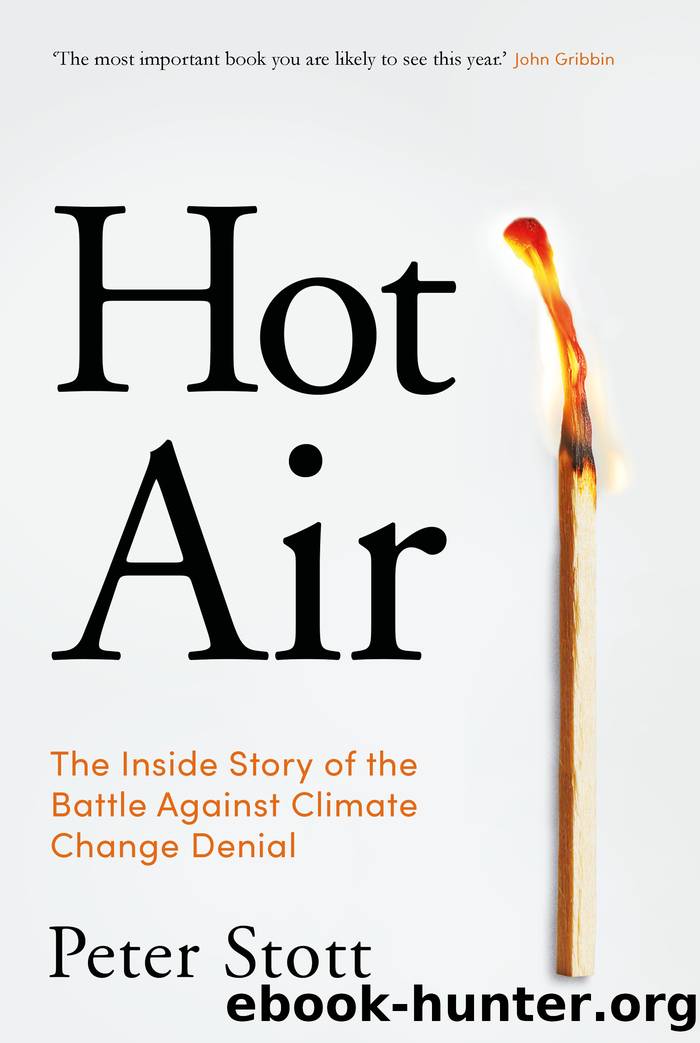Hot Air: The Inside Story of the Battle Against Climate Change Denial by Peter Stott

Author:Peter Stott [Stott, Peter]
Language: eng
Format: epub
ISBN: 9781838952488
Google: A1VxzgEACAAJ
Publisher: Atlantic Books
Published: 2021-10-15T21:21:41+00:00
9
Mounting devastation
The New Zealand newspaper the Dominion Post carried a shocking image on the front page of its edition for Wednesday 9 January 2013. It showed a woman and five young children cowering beneath a jetty in a small Tasmanian township called Dunalley. The terrified victims were floating up to their necks in water while red smoke billowed around them. âFamily of 7 escapes tornadoes of fireâ was the banner headline that accompanied the picture.1 According to the article, record-breaking heat and rapidly spreading flames had brought them to this pass. Stranded in this desperate limbo, breathing toxic air while shivering in clammy water, this photo seemed to sum up what climate change had become for many. Global warming was no longer a question of discernible anthropogenic fingerprints or future climate impacts; it was a matter of life and death.
I had picked up the paper while on holiday across the Tasman Sea in the land of the long white cloud, hiking through the gorgeous scenery of the countryâs South Island. I had been struck by this story, not just because of its graphic depiction of weather-related jeopardy, but because I was soon to travel to close by where the picture was taken. A few days later, I took that long-anticipated trip, my first to Australia, to attend the fourth and final lead author meeting for the Intergovernmental Panel on Climate Changeâs (IPCC) Fifth Assessment Report in Hobart, Tasmaniaâs most populous city. As my plane came into land, I could see burnt landscapes around the airport and smoke billowing around the Tasman Peninsula where the small settlement of Dunalley stood.
From my hotel room I could still see clouds of smoke, a pertinent reminder of why what I did mattered. For the first time since scientists had started to gather to prepare IPCC reports in the late 1980s, our lead author meeting was happening in the immediate aftermath of a weather-related disaster. That felt significant.
I knew that around the globe, the toll of heatwaves, floods and droughts continued to mount. But the fact that such devastating fires had struck so recently so nearby made our task here seem all the more significant. Coincidentally, my co-leader of the section of the IPCC report on the causes of climate change, an Australian scientist called Nathan Bindoff, was based here at the University of Tasmania. For him, the local conflagration was not just of professional interest but also of personal concern, given his own homeâs vulnerability to such fires. The recent events only confirmed a decision weâd made earlier in the writing process: for this IPCC report we needed to break new ground.
Previous reports had concentrated on analysing long-term changes in climate, assessing what had caused the increasing atmospheric temperatures over many decades, the diminishing snow and ice and changing rainfall patterns. It was vital we updated previous assessments with the latest knowledge, so we could determine whether the scientific confidence in the role of human activities on climate had increased. But this time, Nathan
Download
This site does not store any files on its server. We only index and link to content provided by other sites. Please contact the content providers to delete copyright contents if any and email us, we'll remove relevant links or contents immediately.
Man-made Catastrophes and Risk Information Concealment by Dmitry Chernov & Didier Sornette(6007)
The Revenge of Geography: What the Map Tells Us About Coming Conflicts and the Battle Against Fate by Kaplan Robert D(4066)
Zero Waste Home by Bea Johnson(3833)
COSMOS by Carl Sagan(3617)
Good by S. Walden(3548)
In a Sunburned Country by Bill Bryson(3537)
The Fate of Rome: Climate, Disease, and the End of an Empire (The Princeton History of the Ancient World) by Kyle Harper(3055)
A Wilder Time by William E. Glassley(2858)
Camino Island by John Grisham(2794)
Organic Mushroom Farming and Mycoremediation by Tradd Cotter(2688)
The Ogre by Doug Scott(2679)
Human Dynamics Research in Smart and Connected Communities by Shih-Lung Shaw & Daniel Sui(2500)
Energy Myths and Realities by Vaclav Smil(2487)
The Traveler's Gift by Andy Andrews(2457)
9781803241661-PYTHON FOR ARCGIS PRO by Unknown(2365)
Inside the Middle East by Avi Melamed(2352)
Birds of New Guinea by Pratt Thane K.; Beehler Bruce M.; Anderton John C(2251)
A History of Warfare by John Keegan(2240)
And the Band Played On by Randy Shilts(2197)
